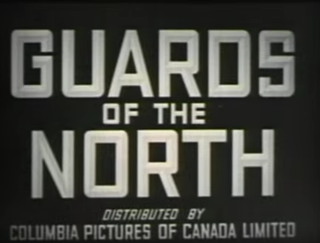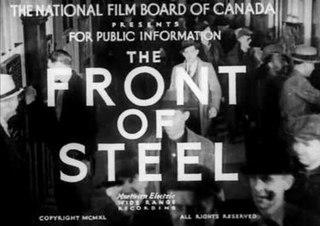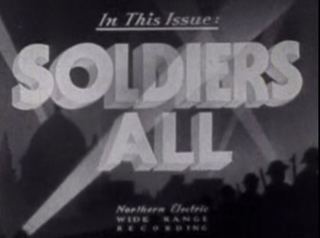
Fighting Norway is a 10-minute 1943 Canadian documentary, part of the wartime Canada Carries On series of short films produced by the National Film Board of Canada. The film was directed by Sydney Newman, one of a number of shorts that were intended for theatrical release.

Warclouds in the Pacific is a 20-minute 1941 Canadian documentary film, part of the Canada Carries On series of short films by the National Film Board of Canada. The film was produced, written and directed by Stuart Legg and narrated by Lorne Greene. Warclouds in the Pacific, which warned of an imminent Japanese attack, was released just one week before the attack on Pearl Harbor.
Canada Carries On was a series of short films by the National Film Board of Canada which ran from 1940 to 1959. The series was created as morale-boosting propaganda films during the Second World War. With the end of the war, the series lost its financial backing from the Wartime Information Board, but continued as an NFB series of theatrical shorts that included newsreels as well as animated shorts.

Flight 6 is a 1944 Canadian documentary film produced by the National Film Board of Canada and directed and primarily photographed by Sydney Newman. The film is part of the Canada Carries On series, which ran from 1940 to 1959. Newman was also the executive producer for the series. Many of the documentaries were created as morale boosting propaganda films during the Second World War.

Wings of Youth is a 1940 Canadian short documentary film, part of the Canada Carries On series of short films by the National Film Board of Canada. The film was directed by Raymond Spottiswoode, produced by Stuart Legg and narrated by Lorne Greene.

Wings of a Continent is a 1941 Canadian short documentary film, part of the wartime Canada Carries On series of short films by the National Film Board of Canada, produced for the Office of Public Information. The film was directed by Raymond Spottiswoode—father of filmmaker Roger Spottiswoode—written and produced by Stuart Legg and narrated by Lorne Greene.

Everywhere in the World is a 16-minute 1941 Canadian documentary film about the contributions of the United States and Commonwealth countries to the Allied war effort. The film was made by the National Film Board of Canada (NFB) as part of the wartime Canada Carries On series. It was produced by Stuart Legg. The film's French version title was Partout au monde.

Pincers on Japan(Piège à Nippon)is a 19-minute 1943 Canadian documentary film, made by the National Film Board of Canada (NFB). The film was directed by James Beveridge, who also produced and directed a similar NFB documentary, Look to the North (1944). Its companion film, Road to Tokyo, was produced in 1942.

Look to the North is a 22-minute 1944 Canadian documentary film, made by the National Film Board of Canada (NFB) as part of the wartime Canada Carries On series. The film was produced and directed by James Beveridge. The title of the film's French version is Vers le Nord.

Guards of the North is a 10-minute 1941 Canadian documentary film, made by the National Film Board of Canada (NFB) as part of the wartime Canada Carries On series. The film, directed by Raymond Spottiswoode, documented the defences of Iceland during the Second World War. The film's French version title is Avant-garde du Nord.

The Battle of Brains is a 13-minute 1941 Canadian documentary film, made by the National Film Board of Canada (NFB) as part of the wartime Canada Carries On series. The film, directed by Stanley Hawes and produced by Stuart Legg, contrasted modern warfare with the First World War. The film's French version title is Sur le front scientifique.

The Front of Steel is an 11-minute 1940 Canadian documentary film, made by the National Film Board of Canada (NFB) as part of the wartime Canada Carries On series. The film, directed by John McDougall and produced by Stuart Legg, is an account of the value of steel in war production in Canada during the Second World War.

The Battle for Oil is a 19-minute 1942 Canadian documentary film, made by the National Film Board of Canada (NFB) as part of the wartime Canada Carries On series. The film was produced by Raymond Spottiswoode and directed and edited by Stuart Legg.The Battle for Oil describes the strategic value of oil in modern warfare. The film's French version title was La Bataille du pétrole.

Letter from Aldershot is a nine-minute 1940 Canadian documentary film, made by the National Film Board of Canada (NFB) as part of the wartime Canada Carries On series. The film was directed by John Taylor and produced by Stuart Legg.

Heroes of the Atlantic is a 1941 15-minute Canadian short documentary film, part of the Canada Carries On series of wartime films by the National Film Board of Canada (NFB), produced for the Office of Public Information. The film documented the work of the Royal Canadian Navy and the Merchant Marine during the Battle of the Atlantic in the Second World War. Heroes of the Atlantic was directed by J.D. Davidson and produced by Stanley Hawes.

Soldiers All is a 20-minute 1941 Canadian documentary film, made by the National Film Board of Canada as part of the wartime Canada Carries On series. The film was directed and produced by Stuart Legg. Soldiers All describes the experiences in 1941 of soldiers, airmen and sailors in Great Britain and Canada during wartime. The film's French version title is Frères d'armes.

Back to Jobs is a nine-minute 1945 Canadian documentary film, made by the National Film Board of Canada (NFB) as part of the postwar Canada Carries On series. The film describes soldiers in the Second World War returning home and back to a civilian life. The French version title of Back to Jobs is Nos soldats reviennent .

The Voice of Action is a 16-minute 1942 Canadian documentary film, directed by James Beveridge and produced by Raymond Spottiswoode. The short film was made by the National Film Board of Canada (NFB) as part of the wartime Canada Carries On series. The Voice of Action describes the importance of the Canadian Broadcasting Corporation (CBC) in the Second World War. The French version title of The Voice of Action is Dynamisme des ondes.

The Children from Overseas is a 10-minute 1940 Canadian documentary film, made by the National Film Board of Canada (NFB) as part of its Canada Carries On series.

Quebec – Path of Conquest is an 11-minute 1942 Canadian documentary film, made by the National Film Board of Canada as part of the wartime Canada Carries On series. The film was directed by Radford Crawley and produced by Raymond Spottiswoode. Quebec – Path of Conquest describes the importance of the province of Quebec to Canada and the Allied war effort during the Second World War. The film's French version title is Québec, tremplin stratégique.



















